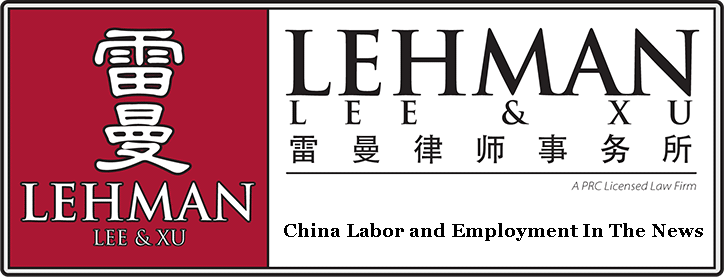Four proposed amendments to the Labor Contract Law have received a massive amount of public interest, with a record number of people contacting authorities to have their say on the law by Sunday night.
Nearly 560,000 online comments were made on the proposed amendments to the Labor Contract Law over the monthlong public suggestion period, according to the website of the National People's Congress. The number of comments sent by post is unavailable.
It is the highest number of comments that the top legislature has received on a legal revision. The second highest number received was 331,000 regarding the Budget Law.
It is not the first time since drafts of laws started to be published online in 2005 that the labor contract bill has attracted wide attention due to its effect on labor rights.
The draft labor contract law received nearly 190,000 public comments within a month in 2006 when the law was drafted, a record at the time.
Wang Xiaolong, a consultant with the Chinese Education, Science, Culture, Health and Sport Workers' Union, said such a large number of opinions collected showed labor outsourcing is overused and it should have been regulated earlier.
"In general, outsourced workers do not enjoy the same wages or social security benefits as regular workers who are doing the same jobs and they are often offered long-term posts rather than the temporary, supportive and substitute positions that the law demands for labor outsourcing," he said.
The law allows employment agencies to be established to provide companies with workers for temporary, supportive and substitute positions, and stipulates that outsourced workers should receive the same pay as those doing the same jobs for the same employers.
Unlike people employed directly by companies, outsourced workers have labor contracts with employment agencies. Those organizations pay the workers' wages and, in return for supplying the workers, charge employers commission and management fees.
There are more than 60 million outsourced workers in China, making up almost 20 percent of the urban workforce, according to a report released last year by the All-China Federation of Trade Unions.
State-owned enterprises and public institutions and industries, such as petrochemical, telecommunication, finance and banking companies, employ the most outsourced workers, the report said.
Wang said in many public hospitals, doctors, pharmacists and nurses are outsourced and in many universities, teachers, researchers and administrative staff are also outsourced.
"All those positions are so important that they should not be regarded as only supportive roles or temporary," he said.
Ye Jingyi, a labor law expert at Peking University, said although the draft defines the three types of positions for the first time, it is not specific enough, and could still leave loopholes for employer manipulation.
Temporary positions refer to jobs that last for no longer than six months; supportive positions refer to jobs that provide a supportive service to main posts; and substitute positions refer to vacancies left by regular workers who leave their jobs to take vacations or study full time, the draft stipulates.
"The definitions of the three types of positions are vague in the draft and what if employers make workers hold supportive and substitute posts for a long time?" she said.
"I think the draft should add a clause, which stipulates that supportive positions should not include those that cannot be separated from main posts.
"The draft should also stipulate that if outsourced workers remain in supportive or substitute positions longer than two or three years, employers should stop outsourcing them and directly employ them," she said.
Web link: http://www.chinadaily.com.cn/china

